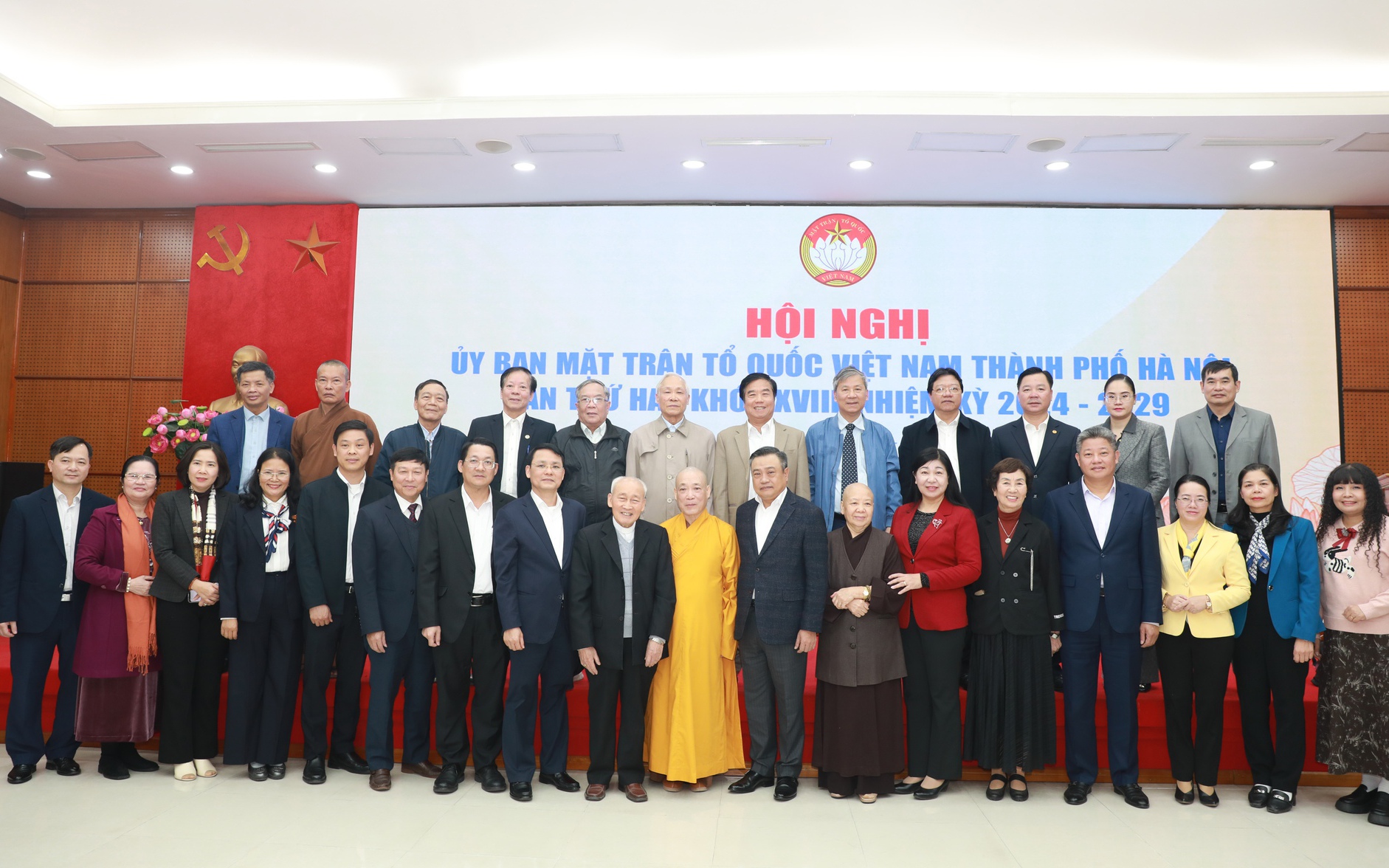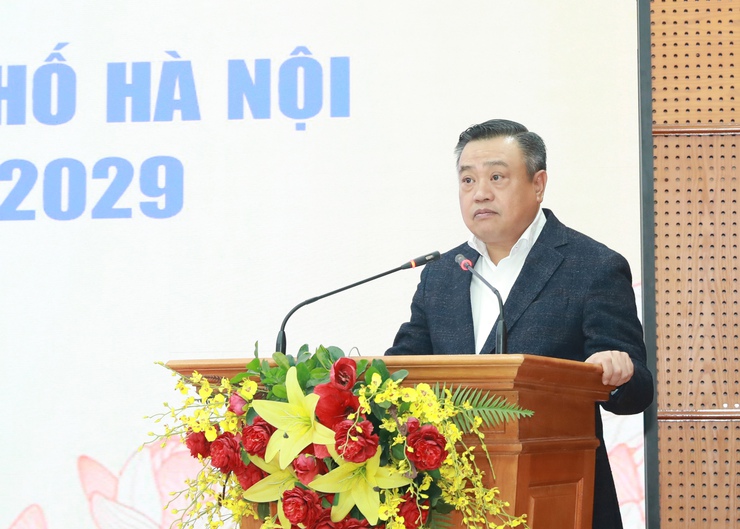The Vietnam Fatherland Front Committee of Hanoi on December 23 held its second meeting for the 18th term, covering the 2024–2029 tenure.
The conference aimed to consolidate the membership of the Vietnam Fatherland Front Committee of Hanoi for the 18th term, 2024–2029, review and summarize the Front's activities in 2024, outline the cooperation program and unified action plan for 2025, and approve the draft regulations and comprehensive working program for the 18th term of the committee.

Delegates at the meeting.
At the event, delegates heard a summary report from Chairman of the Hanoi People's Committee Tran Sy Thanh on significant achievements in the city's socio-economic development in 2024. Hanoi successfully established new mechanisms and policies, creating development opportunities for the capital through the amended Capital Law and two comprehensive master plans for the city.
In 2024, economic recovery was robust, with the city achieving 23 out of 24 planned targets, six of which surpassed expectations. The annual GRDP was projected to grow by approximately 6.52% (compared to 6.27% in the same period), with an estimated size of about $58 billion.
State budget revenue surpassed VND500 trillion ($19.6 billion) for the first time, representing about 24.6% of the national total. Social welfare was prioritized, with successful initiatives to improve citizens' lives and support policy beneficiaries. Urban management, beautification, and development made notable strides, particularly through investments in modern urban transport infrastructure. Key achievements include the completion of 18 Red River bridges, with eight bridges, including Long Bien Bridge, already built or upgraded, and nine more planned.
Rural development achieved outstanding results, with all districts and communes meeting new rural standards, 191 communes reaching advanced standards, and 84 achieving model standards. Administrative reforms and digital transformation tied to Project 06 were implemented with comprehensive, synchronized solutions. Efforts to combat corruption and wastefulness were strengthened. National defense was reinforced, and political security and social order were maintained.
The Party and political system's construction saw continued innovation, with remarkable achievements. Hanoi's Party Committee became the first in the country to launch a comprehensive political campaign titled "A New Era—The Nation's Rising Era," encompassing 50 affiliated party committees, 3,172 grassroots organizations, 17,980 cells, and 481,406 members.
Chairman Tran Sy Thanh attributed these successes to the significant contributions of the Vietnam Fatherland Front at all levels, highlighting their unity, initiative, exemplary conduct, creativity, and effectiveness. The Front served as a foundation for national solidarity and a vital link between Party committees, authorities, and the people.

Hanoi Mayor Tran Sy Thanh at the meeting.
Looking ahead to 2025, Chairman Thanh urged the Front to continue strengthening national solidarity, fostering social consensus, and mobilizing citizens, political-social organizations, and associations toward the city's development.
He emphasized the need to improve the quality and effectiveness of patriotic campaigns and movements, promoting social welfare, supporting policy beneficiaries and vulnerable groups, and promptly implementing disaster relief initiatives.
The Front was tasked with enhancing its roles in social oversight and criticism, advancing public diplomacy, and innovating its operational methods to meet new demands.
In a 2024 review, Vice Chairman Nguyen Sy Truong highlighted the Vietnam Fatherland Front's successful organization of congresses at all levels for the 2024-2029 term, with a focus on information technology. The Front also collaborated with city authorities to celebrate national and local anniversaries, including visits and gifts for veterans, youth volunteers, and civilian contributors.
The people's representative conferences focused on cultural development at grassroots levels, and the National Great Unity Festival featured new content and formats aligned with the year's key tasks. A collaboration with the city resulted in the completion or renovation of 714 "Great Solidarity" houses for impoverished households, eliminating temporary and dilapidated housing.
Social welfare efforts included timely support for victims of natural disasters, such as those affected by Typhoon No. 3. The public recognized and appreciated these actions. The Front also fulfilled its oversight, criticism, and advisory roles, aligning with its functions and responsibilities.
In her closing remarks, Chairwoman Nguyen Lan Huong called on the Front to strictly implement resolutions, directives, and conclusions from the Party Central Committee and Hanoi's authorities. She emphasized the need to translate key tasks into practical actions, promote patriotic campaigns, and focus on initiatives like the "Bright, Green, Clean, and Beautiful" movement, aiming to instill environmental awareness in every citizen.
The Front was directed to strengthen social oversight and criticism while avoiding superficiality, focusing on areas of ineffectiveness. It was tasked with advising on the implementation of key laws, including the amended Capital Law and Land Law, ensuring alignment with Hanoi's developmental needs.
Efforts were urged to streamline organizational structures, enhance staff quality, and modernize Front activities through digital transformation. Each district and commune-level Front unit was encouraged to initiate at least one project or activity reflecting innovation, celebrating upcoming Party Congresses and significant national and local anniversaries.
In preparation for the upcoming Lunar New Year, the Front was to focus on supporting disadvantaged families and ensuring timely and accurate aid distribution.
The conference approved three new members to the committee for the 2024–2029 term, including Permanent Deputy Secretary of the Municipal Party Committee Nguyen Van Phong.